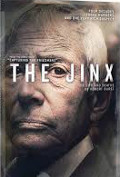
Directed by
Andrew Jarecki
279 minutes
Rated MA
Reviewed by
Bernard Hemingway


The Jinx: The Life And Deaths Of Robert Durst
Director Andrew Jarecki, best known for his 2003 Oscar-nominated Capturing The Friedmans, made a fictional film in 2010 (2008 actually but it was not released for two years) based on the life of Robert Durst, the eldest son of one of New York's wealthiest families who had been accused of three murders but never convicted of any of them. Durst saw the film and remarkably, against legal advice, approached Jarecki to tell his side of the story. The result is this six-part HBO series.
It is often said that truth is stranger than fiction. In this case it is not only stranger but it is better. Jarecki's first crack at the story, All Good Things, made a reasonable pass at telling Durst’s story in a fictional format (co-writer on that film, Marc Smerling, is a co-producer here) but this new take benefits not only from the thoroughgoing research and methodical exposition and but also the presence of the real life players, the principal of which is Durst himself. The outcome is a revealing portrait of the human psyche as well as an impressive piece of film-maker’s sleuthing, not to mention a very significant dose of pure luck.
The Jinx opens in 2001 with the discovery of a headless torso washed up in Galveston Bay, Texas and like the fictional version it then jumps backward and forward in time to tell Durst’s story from his dysfunctional childhood, to the disappearance of his first wife in the early 80s to his arrest for the murder and dismemberment of his neighbour in 2001 and his possible involvement in the subsequent murder of an long-standing friend.
It is a fascinating story with many strands, Durst’s very wealthy family background being one of them, which benefits, this time around from the presence of the actual players. You will be kept busy looking for “tells” in the warp and woof of vested interests, not least of which are the statements made by Durst himself as Jarecki diligently takes you through each element of the story and talks to family members, lawyers, policemen and eventually, as he tries to negotiate his way through the mix of facts, outright lies and half-truths that Durst has laid on him, himself, as he confronts his own feelings about his idiosyncratic but seemingly reasonable subject (Jarecki not only like Durst comes from a wealthy family but he made a fortune in the early days of the internet with an information service called Moviefone, something which not only gives the two men something of a shared universe but also explains the clearly considerable amount of time spent on this project).
What emerges from the efforts of Jarecki and his team is a remarkable exposé of what has been called in another context, “the banality of evil”, a reptilian callousness concealed by our willingness to trust and our unique ability to lie to each other.
FYI: Anyone who finds this of interest should also check out Errol Morris's classic 1988 documentary, The Thin Blue Line
Want something different?





